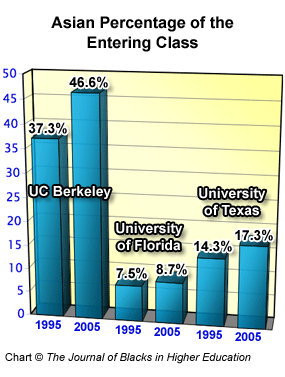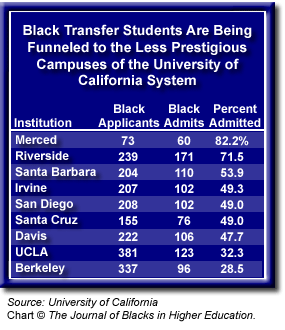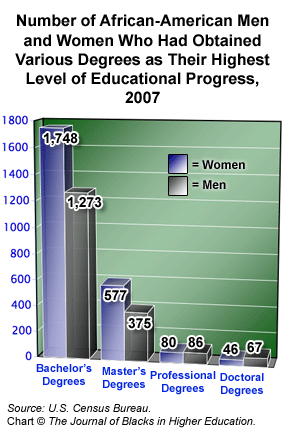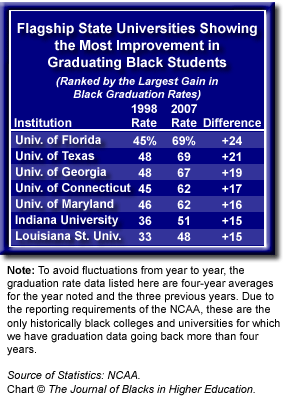New Study Finds That Bans on Affirmative Action Have Boosted Asian Enrollments at the Expense of African Americans
A study published in interActions: UCLA Journal of Education and InformationStudies examined racial enrollment data at universities in California, Texas, and Florida — three states where bans on affirmative action were established in the 1990s. The bans remain in force in California and Florida but have been rescinded in Texas.
The data shows that in all three states black enrollments were harmed by the bans. In California the damage was extensive, particularly at UCLA and Berkeley. At the University of Florida the black percentage of the entering class dropped from 11.3 percent in 2000 to 9.4 percent in 2005. At the University of Texas the black percentage of the entering class dropped from 4.9 percent in 1995 to 3.4 percent in 2002. The affirmative action ban in Florida was lifted in 2003 after the Supreme Court’s ruling in Grutter. Black first-year enrollments at the University of Texas are now above the level that prevailed prior to the ban on race-sensitive admissions.
In all three states the ban on affirmative action led to an increase in Asian-American enrollments. At Berkeley the Asian percentage of the entering class increased from 37.3 percent in 1995 to 46.6 percent in 2005. There were similar increases in Asian-American enrollments at UCLA and the University of California at San Diego.
At the University of Florida the percentage of Asians in the freshman class rose from 7.5 percent in 1995 to 8.7 percent in 2005. At the University of Texas the Asian percentage of black first-year students increased from 14.3 percent in 1995 to 17.3 percent in 2005.



UTAH STATE UNIVERSITY

Assistant Professor, Watershed Sciences
THE DEPARTMENT OF WATERSHED SCIENCES at Utah State University offers a tenure-track Assistant Professor position with an emphasis on watershed restoration. Watershed restoration is a broad field, and we encourage applicants whose focus applies hydrology, geomorphology, or ecology to restoration at the stream or watershed scale. As part of USU’s mission to make its academic programs accessible throughout the state, this position will be located at USU-Uintah Basin Regional Campus in northeastern Utah. This is a 9-month, tenure-track position. The initial appointment will be approximately 60% teaching, 35 % research, and 5% service, but may be adjusted in the future to meet changing needs of the Watershed Sciences Department and the Uintah Basin Regional Campus. A full position description may be found at http://www.cnr.usu.edu.
Minimum qualifications include a PhD in Watershed Science or related discipline at the time of appointment. Application review will begin 31 March 2008 and will continue until the position is filled. The position will be available August 2008. Applicants should submit a letter describing their qualifications for the position including a statement of teaching philosophy, a current curriculum vita, samples of scholarly work, and contact information for a minimum of three references. To apply, go to: https://jobs.usu.edu/applicants.

Vanderbilt University’s Vast New Archive of East African Music Now Available Online
 Gregory F. Barz is a professor at the Blair School of Music at Vanderbilt University. Barz has a Ph.D. in ethnomusicology from Brown University. He fears that as Western culture — particularly popular music — spreads rapidly throughout the world, centuries-old musical traditions may be lost. Therefore, he has set about to create an archive of East African music. Gregory F. Barz is a professor at the Blair School of Music at Vanderbilt University. Barz has a Ph.D. in ethnomusicology from Brown University. He fears that as Western culture — particularly popular music — spreads rapidly throughout the world, centuries-old musical traditions may be lost. Therefore, he has set about to create an archive of East African music.
Begun three years ago, Professor Barz’s Digital Collection of East African Recordings is the largest such archive in the world. The collection includes more than 2,000 musical performances, most of which were recorded on location in Kenya and Uganda.
Vanderbilt has created a Web site where these recordings can be heard online. Selections have a running time of between 45 seconds and one hour. Downloads are not permitted.
The archive can be accessed by clicking here.
Black Students Transferring From Community Colleges Are Funneled to the Least Prestigious Campuses of the University of California System
 Last week, JBHE reported that black students who graduated from community colleges in California were significantly less likely than students from all other major ethnic groups to be accepted for admission to the University of California. Last week, JBHE reported that black students who graduated from community colleges in California were significantly less likely than students from all other major ethnic groups to be accepted for admission to the University of California.
When we break down the data for each of the nine undergraduate campuses of the University of California system, we discover that those black students who are accepted are funneled to the least prestigious campuses. Only 28.5 percent of black transfer students who applied to Berkeley were admitted. At UCLA less than one of three black transfer students was admitted.
But at the new University of California at Merced campus, a whopping 82.2 percent of all black applicants were admitted. At the University of California at Riverside, which has seen a huge influx of black students since the enactment of Proposition 209, 71.5 percent of all black transfer applicants were admitted.


SOUTHERN CONNECTICUT STATE UNIVERSITY

Assistant I Associate Professor, Graduate Reading Certification Program
The Department of Special Education and Reading seeks applicants for a tenure track position in the Graduate Reading Certification Program.
RESPONSIBILITIES
• Teach graduate level courses in Reading I Language Arts with emphasis on diagnostics and remediation (normal teaching load is four courses per semester)
• Graduate student advisement
• Department and University service
• Research and/or scholarly creative activity
QUALIFICATIONS
Required
• Earned doctorate in Reading or a related field
• Minimum of three years K-12 Reading / Language Arts teaching
• Knowledge I experience with teaching graduate level courses in diagnosis and remediation
• Experience with clinical supervision
• Record of, or strong potential for, scholarly activity
• Computer literacy
Preferred
• Experience at the Middle and Secondary level
• Capability to develop and direct Reading Center
APPLICATION PROCESS: Applicants should submit a letter of interest, a detailed resume, and three letter of reference to Dr. Patricia Major, Search Committee Chair, Department of Special Education and Reading, Southern Connecticut State University, 501 Crescent St., New Haven, CT 06515. In order for your application to be given full consideration, all materials must be received by February 16, 2008. Position will remain open until filled.

Elnora Daniel to Step Down From Presidency of Chicago State University
 Since assuming the presidency of Chicago State University nearly a decade ago, Elnora D. Daniel has accomplished a great deal. Academic offerings have been enhanced, new buildings have been constructed, and fundraising efforts have been revitalized. But her presidency has not been without controversy. State auditors have questioned university spending and contracting policies. Enrollments have declined and the university’s graduation rate remains among the lowest in the nation. Since assuming the presidency of Chicago State University nearly a decade ago, Elnora D. Daniel has accomplished a great deal. Academic offerings have been enhanced, new buildings have been constructed, and fundraising efforts have been revitalized. But her presidency has not been without controversy. State auditors have questioned university spending and contracting policies. Enrollments have declined and the university’s graduation rate remains among the lowest in the nation.
There are about 5,200 undergraduate students at Chicago State University, about 85 percent of whom are black.
Dr. Daniel had requested an extension of her contract, which expires at the end of this academic year, but it became apparent that none was forthcoming. In order to take advantage of a clause in her contract, Daniel notified the board that she would retire in June 2009 after taking a sabbatical beginning this coming June.
Daniel, who served as provost at Hampton University before coming to Chicago State, holds a master’s degree and an educational doctorate from Teachers College at Columbia University.
Postal Service Honors African-American Novelist Charles W. Chesnutt
 To commemorate Black History Month, the United States Postal Service recently released the 31st stamp in its Black Heritage series. This year’s honoree is Charles W. Chesnutt. To commemorate Black History Month, the United States Postal Service recently released the 31st stamp in its Black Heritage series. This year’s honoree is Charles W. Chesnutt.
Chesnutt was born in Cleveland, Ohio, in 1858. His parents were free-born blacks who had moved to Ohio from North Carolina. His father was a grocer. The Chesnutts had very light complexions and easily could have passed for whites. But after the Civil War the family decided to return to the South to live as Negroes. Young Charles received some early schooling but taught himself mathematics, history, and ancient languages. He also became proficient in stenography.
At age 25 Chesnutt moved back to Cleveland. A “voluntary Negro” who refused to pass for white, Chesnutt used his stenographic skills to secure work so that he could study law at night. He passed the Ohio bar in 1887. He then launched a successful career operating a stenographic service for the Ohio court system.
Chesnutt’s economic success permitted him to dabble in his first love — writing. With his first novel The House Behind the Cedars, he became the nation’s first commercially successful African-American writer of fiction. Over the course of a long career, he wrote three novels, a biography of Frederick Douglass, and some 80 short stories.
Chesnutt died in 1932 at the age of 74.
President’s Budget Cuts Funds From Black College Program
 President Bush recently proposed the nation’s first $3 trillion budget. The new plan showed some penny-pinching in allocations for the nation’s historically black colleges and universities. The budget plan stripped $85 million from the Strengthening Historically Black Colleges and Universities program. President Bush recently proposed the nation’s first $3 trillion budget. The new plan showed some penny-pinching in allocations for the nation’s historically black colleges and universities. The budget plan stripped $85 million from the Strengthening Historically Black Colleges and Universities program.
In a statement, Michael L. Lomax, president of the United Negro College Fund, called the budget plan “disastrous for HBCUs and the tens of thousands of young Americans who are working so hard to achieve their dreams of a college education.”

UTAH STATE UNIVERSITY

Assistant Professor, Department of Secondary Education
The Department of Secondary Education, Utah State University, offers an Assistant or Associate Professor position, with an emphasis in Social Studies education. This position is a tenure track, 9-month academic year (approximately 70% teaching, 25% research, and 5% professional service), with the opportunity for summer employment dependent on the availability of funds. The Department has numerous outreach programs within the Utah State University system, as well as partnerships with other Utah colleges and universities. As part of USU's mission to make its academic programs more accessible throughout the state, this position will be physically located at USU-Tooele Campus in Tooele, Utah.
Responsibilities include (1) Teach undergraduate and graduate courses in multicultural and Social Studies education, (2) Recruit students into the Social Studies composite major, (3) Advise students in the Secondary Education Teacher Preparation Program, (4) Engage in academic scholarship which includes grant writing and conducting/ publishing high-quality research in area of expertise, (5) Serve on and chair graduate student committees, (6) Supervise Student Teachers, (7) Provide national, state, and local service to the profession.
EdD or PhD with emphasis in social studies education or related field by August 12, 2008 is required. See http://jobs.usu.edu (req. ID 051181) for more information and to apply online. AA/EOE

Awards
 • Michael L. Jackson, vice president for student affairs at the University of Southern California, will receive the 2008 Scott Goodnight Award from the National Association of Student Personnel Administrators at the organization’s annual convention in Boston next month. The award is named after the organization’s founding president. • Michael L. Jackson, vice president for student affairs at the University of Southern California, will receive the 2008 Scott Goodnight Award from the National Association of Student Personnel Administrators at the organization’s annual convention in Boston next month. The award is named after the organization’s founding president.
Dr. Jackson, who has been vice president of student affairs at USC since 1995, is a graduate of Stanford University. He holds a master’s degree and an educational doctorate from the University of Massachusetts at Amherst.
 • George T. French Jr., president of Miles College in Fairfield, Alabama, received the distinguished Leadership Award from Project One. The not-for-profit organization, based in Louisville, Kentucky, seeks to prepare disadvantaged youth and adults for the transition to college and employment opportunities. • George T. French Jr., president of Miles College in Fairfield, Alabama, received the distinguished Leadership Award from Project One. The not-for-profit organization, based in Louisville, Kentucky, seeks to prepare disadvantaged youth and adults for the transition to college and employment opportunities.
• Claremont McKenna College, the highly selective liberal arts institution in California, awarded the Henry R. Kravis Prize in Leadership to The Forum for African Women Educationalists (FAWE). The prize, which comes with a $250,000 award, was given to the group because of its efforts to provide education to an estimated 12 million girls and women in sub-Saharan Africa.
 The award will be presented to Dr. Codou Diaw, executive director of FAWE, at ceremonies in New York this coming April. Diaw, a native of Senegal, holds a Ph.D. from the University of Maryland Baltimore County. The award will be presented to Dr. Codou Diaw, executive director of FAWE, at ceremonies in New York this coming April. Diaw, a native of Senegal, holds a Ph.D. from the University of Maryland Baltimore County.
• Stephanie Nyombayire, a senior at Swarthmore College in Pennsylvania, received the Young Rwandan Woman Achiever Award presented by Jeannette Kagame, First Lady of Rwanda. Nyombayire, who is majoring in political science, was honored for her work against the genocide in Darfur.
|
The Large Gender Gap in Degree Attainments Among African Americans
Today there are 2,451,000 black women holding a four-year degree or better compared to only 1,801,000 black men. Therefore, it turns out that black women have almost 58 percent of all the bachelor’s degrees earned by blacks in our country.
Some 577,000 black women hold a master’s degree compared to 375,000 black men. Thus, black women hold 61 percent of all African-American master’s degrees, an even larger share of their total in bachelor’s degree attainments.
Black men continue to have a lead over black women in their number of professional degrees. Approximately 86,000 black men have a professional degree in the United States today compared to 80,000 black women. But black women have almost closed the gap. In view of the fact that black women now earn nearly two thirds of all new professional degrees earned by African Americans, it will only be a few years before black women overtake black men in the total number of professional degrees held by living African Americans.
Black men continue to hold the lead in doctorates. Black men hold 67,000 of the 113,000 doctorates held by living African Americans. But this gap is also likely to close in the years ahead. Black women now earn 65 percent of all new doctorates awarded to African Americans.

  |
“For African Americans, ‘voluntary separation’ need not be a problem. It is a choice to preserve the cultural heritage and values that are often undermined when minorities assimilate into the mainstream. Black universities and colleges are examples of the benefits of such choices.”
— Lola Adesioye, an American correspondent for the London Guardian
|
Spectacular Gains in Black Student Graduation Rates at Flagship State Universities
Blacks are making tremendous progress in improving their graduation rates at flagship state universities. These universities, combined, educate tens of thousands of black students.
At 25 flagship universities with large numbers of black students, the graduation rate has improved at 24 institutions since 1998. The only exception is the University of Virginia, which maintained its leading 87 percent black student graduation rate over the period.
Some of the black graduation gains have been spectacular. For example, the black student graduation rate at both the University of Florida and the University of Texas has increased by more than 20 percentage points since 1998. At the University of Georgia, the University of Connecticut, and the University of Maryland, the black student graduation rate has improved by more than 15 percentage points.



Director of Education
The Barnes Foundation is seeking a nationally respected individual to oversee its educational programs, both at Merion, and at the new facility on the Benjamin Franklin Parkway in Philadelphia.
The Director of Education will manage the Education Department, and have responsibility for all art courses, as well as for coordinating the teaching of horticulture courses with the Director of the Barnes Arboretum. The Director of Education will report directly to the Foundation’s Executive Director.
The Foundation was established as an Educational institution by Dr. Albert C. Barnes, and was intended to reflect the approach to the study of art that was articulated by Dr. Barnes and John Dewey. The successful candidate will sustain and interpret this approach to education and democratic learning in the traditional Barnes courses, making it relevant to the Foundation in the 21st century. The Director of Education will create a range of additional courses that will illuminate works of art from the wide range of cultures that Dr. Barnes collected, including not only European works but also those from Africa, Asia, and Native American societies. The Director of Education will collaborate in partnership with the faculty of Lincoln University to inaugurate Lincoln’s new visual arts degree program, taught in conjunction with the Barnes Foundation.
Requirements for the position include familiarity with Post-Impressionist and Modernist art‹for which the Barnes Collection is best known as well as graduate qualifications in a relevant field, and several years experience in art education. The successful candidate will be an excellent writer and public speaker, who can effectively manage staff and also work with a variety of external constituencies. Applications should be addressed to the Honorable Phyllis Beck, The Barnes Foundation, 300 N. Latch’s Lane, Merion, PA 19066. The deadline is March 7th, 2008.

Study Finds That Blacks Are Rarely Featured in College-Level Political Science Textbooks
 The American Political Science Association’s Standing Committee on the Status of Blacks in the Profession has published a study in the organization’s journal, PS: Political Science & Politics, on the extent that blacks are portrayed in the discipline’s textbooks. The committee reviewed 27 different college textbooks to determine if they included discussions of issues of importance to African Americans and whether they contained opinions by black political experts or citations of their works. The American Political Science Association’s Standing Committee on the Status of Blacks in the Profession has published a study in the organization’s journal, PS: Political Science & Politics, on the extent that blacks are portrayed in the discipline’s textbooks. The committee reviewed 27 different college textbooks to determine if they included discussions of issues of importance to African Americans and whether they contained opinions by black political experts or citations of their works.
The results showed that most textbooks had chapters on the civil rights movement, but that otherwise black views and opinions were largely nonexistent in these textbooks. The study concludes that “African Americans’ active participation in America’s political development has been treated as a separate entity.”
The study was authored by Sherri L. Wallace, an associate professor of political science at the University of Louisville, and Marcus D. Allen, an assistant professor of political science at Wheaton College in Massachusetts.
New Scholarship Fund for African Students Established at Brown University
 Brown University, the Ivy League college in Providence, Rhode Island, has announced the establishment of the Advancing Africa Scholarship Fund. So far nearly $6 million has been pledged to endow the new fund. Brown University, the Ivy League college in Providence, Rhode Island, has announced the establishment of the Advancing Africa Scholarship Fund. So far nearly $6 million has been pledged to endow the new fund.
Recipients of the new scholarship will be asked to sign a pledge to return to their native African countries for at least two years following their graduation from Brown. Recipients may defer returning to Africa until completing graduate education. When they return to Africa, scholarship recipients will be entitled to a monthly stipend for a period of two years.
Currently there are 36 students from sub-Saharan African nations at Brown University. Eighteen are undergraduates, 17 are graduate students, and one is a medical school student.
  |
90.5% Percentage of all white adults over the age of 25 in the United States in 2007 who had a high school diploma.
82.3% Percentage of all African-American adults over the age of 25 in the United States in 2007 who had a high school diploma.
source: U.S. Census Bureau
|
Black Faculty in the Earth Sciences
 The earth sciences include such fields as geology, oceanography, mineralogy, petrology, meteorology, and environmental sciences. It is an area of study in which historically there have been very few black scholars. In 2006 there were fewer than five African Americans who received a Ph.D. in earth sciences. The earth sciences include such fields as geology, oceanography, mineralogy, petrology, meteorology, and environmental sciences. It is an area of study in which historically there have been very few black scholars. In 2006 there were fewer than five African Americans who received a Ph.D. in earth sciences.
Donna J. Nelson, an associate professor of chemistry at the University of Oklahoma, recently conducted a faculty survey of the 90 universities with the largest research budgets in earth sciences. There are 2,047 earth sciences faculty at these 90 research universities. Only 19, or 0.9 percent, are black.
There are three blacks teaching earth sciences at the Missouri University of Science and Technology in Rolla. Two are full professors and one chairs the department of geology and geophysics. There are two black faculty members in the earth sciences at the University of Michigan and Oregon State University.
Only four of the 19 black earth scientists are women.

UNIVERSITY OF TOLEDO

Professor and Chair, Department of Urology
The University of Toledo College of Medicine invites applications and nominations for the position of Professor & Chair, Department of Urology. The merger of the University of Toledo with the former Medical University of Ohio has created remarkable growth opportunities. Substantial resources are available to expand the department building on current strengths, including a fully-accredited, highly competitive residency program; strong and consistently funded basic research, robotics and minimally invasive urological surgical projects; and a successful renal transplant program including the nationally recognized paired donation/altruistic donor programs.
The Chair must have the creativity, flexibility, and vision to achieve the goals and mission of the department, be committed to medical and graduate education, and serve in a leadership capacity in the institution. The Board Certified candidate must possess a track record of building and sustaining high quality and financially strong clinical and research programs and exhibit outstanding leadership and administrative skills.
The attractive 550-acre University of Toledo Health Science Campus includes the University Medical Center and the Colleges of Medicine, Nursing, Graduate Studies, and Health Science & Human Service. Information about the University can be obtained on the website www.utoledo.com.
Candidates should send a curriculum vitae, a cover letter summarizing clinical, educational, research and administrative background, and the names and addresses of 3 references to: Chair, Urology Search Committee, c/o Shirley Joseph, COM Dean’s Office, University of Toledo Health Science Campus, 3045 Arlington Avenue, Toledo Ohio 43614, or email shirley.joseph@utoledo.edu. Telephone: 419 383 6002.
The University of Toledo is committed to diversity and equal opportunity.
Applications from women and minority candidates are strongly encouraged.

In Memoriam
M. Boyd Jones (1909-2008)
M. Boyd Jones, a civil rights leader and a long-time professor at Norfolk State University, died late last month in Virginia Beach. He was 98 years old.
A native Virginian, Dr. Jones graduated from Hampton University and went on to earn a master’s degree and a Ph.D. from Cornell University.
He began his career as a teacher in Virginia’s segregated public schools and rose to the rank of principal at the all-black Robert R. Moton High School in Farmville. In 1951 black students at the school walked out in protest of the conditions at the school, which was vastly inferior to nearby white schools. Boyd supported his students, and as a result lost his job.
Virtually barred from teaching in Virginia, Boyd took a position on the faculty at Alabama State University. More than a decade later, in 1963, he returned to Virginia to teach mathematics at Norfolk State University. He remained on the faculty there until his retirement in 1980.
In 2007 a scholarship fund in Dr. Boyd’s name was established at Norfolk State to benefit students in mathematics and the sciences.
Appointments
 • Jhan Doughty Berry was promoted to director of student retention and diverse student success at Miami University in Ohio. She was the director of research compliance at the university. • Jhan Doughty Berry was promoted to director of student retention and diverse student success at Miami University in Ohio. She was the director of research compliance at the university.
Dr. Berry is a graduate of Xavier University of Louisiana. She holds a master’s degree and a doctorate in counselor education from Pennsylvania State University.
 • Diedre Badejo was appointed dean of the College of Letters, Arts and Social Sciences at California State University, East Bay in Hayward. Dr. Badejo was a professor of English, chair of the Pan African Studies department, and associate dean of curriculum at Kent State University in Ohio. • Diedre Badejo was appointed dean of the College of Letters, Arts and Social Sciences at California State University, East Bay in Hayward. Dr. Badejo was a professor of English, chair of the Pan African Studies department, and associate dean of curriculum at Kent State University in Ohio.
Dr. Badejo is a graduate of the University of Southern California. She holds a master’s degree in African studies and a Ph.D. in comparative literature from the University of California at Los Angeles.
 • Joyce Green was hired as the liaison to the state legislature by South Carolina State University. She was director of strategic planning and operations at the South Carolina Budget and Control Board. • Joyce Green was hired as the liaison to the state legislature by South Carolina State University. She was director of strategic planning and operations at the South Carolina Budget and Control Board.
Green is a graduate of Benedict College and has done graduate work at The Citadel and the University of South Carolina.
Grants
 • Howard University received a $1 million grant from the Alpha Kappa Alpha, the first sorority founded by black women. The funds will be used to create an endowed scholarship program to honor Nellie Quander, the sorority’s first president. The endowment will also be used to maintain the large collection of sorority documents housed at the university’s Moorland-Spingarn Research Center. • Howard University received a $1 million grant from the Alpha Kappa Alpha, the first sorority founded by black women. The funds will be used to create an endowed scholarship program to honor Nellie Quander, the sorority’s first president. The endowment will also be used to maintain the large collection of sorority documents housed at the university’s Moorland-Spingarn Research Center.
 • Florida A&M University, the historically black educational institution in Tallahassee, received a $250,000 grant from Walgreens, the drug store retailer. The grant will be used for scholarships for students in the university’s College of Pharmacy and Pharmaceutical Sciences. • Florida A&M University, the historically black educational institution in Tallahassee, received a $250,000 grant from Walgreens, the drug store retailer. The grant will be used for scholarships for students in the university’s College of Pharmacy and Pharmaceutical Sciences.
 • The University of Missouri received a $25,000 gift from an alumnus to establish an endowment fund to support the university’s black studies program. The gift was from the great-great-grandson of James S. Rollins, one of the founding fathers of the university who, prior to the Civil War, owned 34 slaves. The fund will be called the James S. Rollins Atonement Fund. • The University of Missouri received a $25,000 gift from an alumnus to establish an endowment fund to support the university’s black studies program. The gift was from the great-great-grandson of James S. Rollins, one of the founding fathers of the university who, prior to the Civil War, owned 34 slaves. The fund will be called the James S. Rollins Atonement Fund.
 • The National Science Foundation has announced a $1.1 million grant to further the funding of the Enhancing Diversity in Graduate Education initiative aimed at increasing the number of minority women pursuing graduate study in mathematics. The program was founded and is currently led by Rhonda Hughes, a mathematics professor at Bryn Mawr College, and Sylvia Bozeman, professor of mathematics at Spelman College. • The National Science Foundation has announced a $1.1 million grant to further the funding of the Enhancing Diversity in Graduate Education initiative aimed at increasing the number of minority women pursuing graduate study in mathematics. The program was founded and is currently led by Rhonda Hughes, a mathematics professor at Bryn Mawr College, and Sylvia Bozeman, professor of mathematics at Spelman College.
|
 .
.